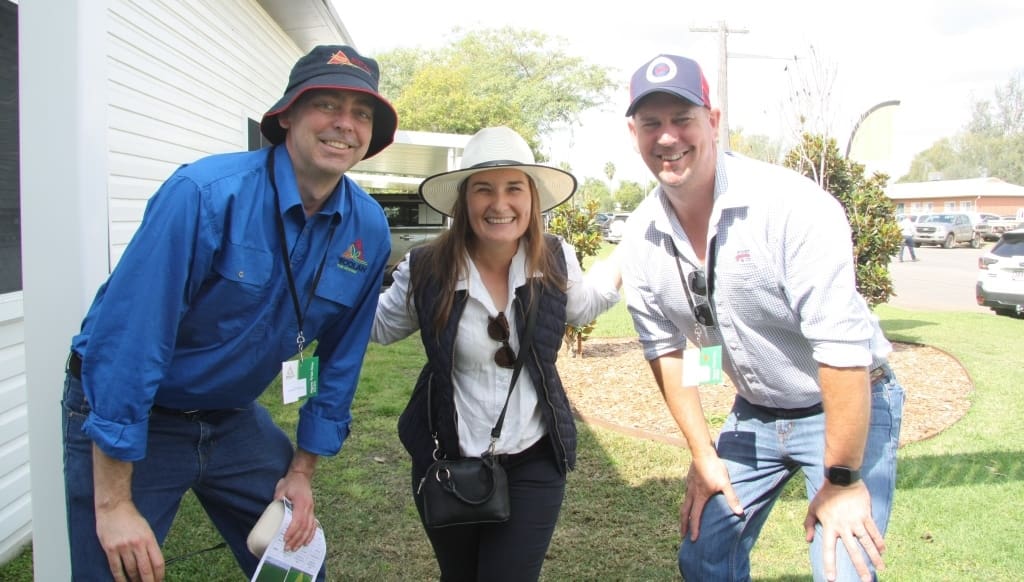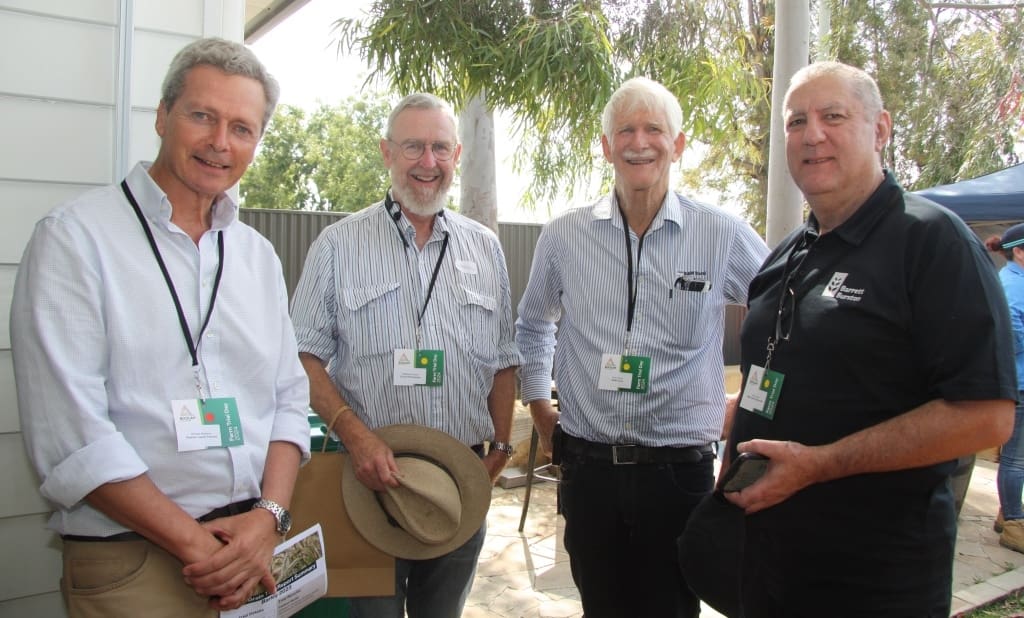
Asahi Beverages group senior manager raw material development Mark Goldsmith and Boolah head of R&D Brooke Sauer with a 10ha plot of Neo barley which received an in-crop treatment of yeast extract, a byproduct of the brewing process.
REGENERATIVE farming and the malting barley supply chain laid bare took centre stage at PURE Grain’s inaugural field day.
Held yesterday on Boolah’s 435ha trial farm at Pallamallawa, it attracted more than 300 visitors to what is believed to be Australia’s largest commercial trial site, and was held in conjunction with a trade show, and information and panel sessions at the Pally Pub.
 Crops in the 44 trial sites started in 2021 include cereals treated with synthetic and organic-based fertilisers, and sometimes a mix of the two, as well as a range of biological stimulants for the soil.
Crops in the 44 trial sites started in 2021 include cereals treated with synthetic and organic-based fertilisers, and sometimes a mix of the two, as well as a range of biological stimulants for the soil.
The most unique treatment appeared in the Circular Economy plot, where Neo barley was treated with a yeast extract, a byproduct of the brewing process for PURE Grain’s No. 1 customer, Asahi Beverages.
Speaking at the plot, Asahi’s Mark Goldsmith said yeast extract has been used as a plant stimulant by Asahi in Japan on rice, potato and tomato crops, and has made its broadacre debut on Boolah’s trial farm.
“I thought: Could this work in Australia? I presented the idea to Boolah and they said ‘yes’,” Mr Goldsmith said.
The plot is expected to yield 4.5-5 tonnes per hectare when Boolah starts what it, and the wider region, is expecting to be a bumper harvest in the first half of next month.
Barley to spec on the trial farm will head to Barrett Burston’s Pinkenba plant, the source of malt for Asahi’s Yatala brewery.

Loam Bio’s business development manager national key accounts Torben Heinzel speaks to one of the three groups on the field day.
ReGen4Real gets grower, brewer attention
The Boolah team, headed by Stuart and Lyndall Tighe, and the group’s head of research and development Brooke Sauer, were delighted to have so many attend what is planned to become an annual event.
The day was well supported by growers and consultants, and reseller agronomists from northern New South Wales and into Queensland.
What made it unique was representation from Boortmalt and Malteurop, which along with Barrett Burston form Australia’s three largest maltsters, as well as brewers from the Lion stable, owned by Asahi rival Kirin.

Stuart and Lyndall Tighe.
It shows the level of interest the malting and brewing sector has in lowering its emissions through using barley grown through a farming system the Boolah team has dubbed ReGen4Real.
“I do prefer the term regenerative over sustainable,” Mr Tighe said, adding that sustainability needed to stack up economically and not just environmentally.
“There’s no point being sustainable if it is not profitable.”
Mr Tighe said precision farming was “moving the dial in small percentages”, and paying more attention to what happened under the ground could deliver a faster path to profitable regenerative farming.
“The big mover of the dial can be to understand our soils better.”
“The trial farm is here to explore emerging technologies…to significantly improve agricultural practices.”
Boolah was established in 2002, and delivered its first load of malting barley to a Barrett Burston plant in 2009.
“Five years ago, we launched PURE Grain, really to bridge that gap between growers and end users.”
Mr Tighe said research, which includes trials conducted in conjunction with a range of companies represented at the field day, is very much part of the picture.
“Together we aim to become more resilient.
“When we stay in our own silos and compete against each other, it’s not the best way forward.”
Mr Tighe said he believed environmental, social and governance criteria, and carbon accounting, would become mandatory, and that would drive investment preferences towards companies with desirable metrics.
“It’s driven by the entities with the money; without the money, business won’t grow.
“Entities that have the money need to know where they’re investing isn’t doing something bad.”
Ms Sauer has been instrumental in designing the trials and collecting the data, and some trials are now in their third year, and some are part of 5 to 10-year projects.
She told the gathering that Boolah’s objectives were closely aligned with those of the end users, and interest in being part of the trial was growing.
“We’ve moved from three to 12 partners in the past 12 months,” Ms Sauer said.
One of those partners is Terra Firma, which manufactures granular fertiliser from chicken manure at Beaudesert, south of Brisbane.
While trial results augur well for the Boolah Group, which includes Boolah Ag Services and Boolah Connected Farms as well as PURE Grain, they also make good marketing material for research partners.
Terra Firma’s Ruby Earsman told the gathering that wheat yields have on average been 9 percent above the control crop which uses traditional synthetic product as its starter fertiliser.

The PURE field day brought more than 300 attendees to Boolah Farm’s trial site, and to the Pally Pub to hear from some involved in the trial, Boolah and the PURE Grain network.

Boolah Farms’ Taylah Cooper, grain operations manager Helen Dickson and head of R&D Brooke Sauer with Multikraft Probiotics Australia general manager Trent Durrington, Gold Coast.

Pallamallawa farmer Oscar Pearse, Lee and Cassie Coleman from FarmSimple, Croppa Creek, and Sundown Pastoral Company general manager cropping operations Nick Gillingham, Keytah.

Stone & Wood raw materials coordinator Tom Eichmann, South Murwillumbah, Barrett Burston Malting president for Asia Philip Robinson, Loop Brands managing director Ed Kirk and 2TE managing director Robert Commens.

Southern NSW visitors Riverine Plains CEO Pip Grant and senior project manager Jane McInnes with AMPS research agronomist Matt Gardner.

Asahi Beverages’ Mark Goldsmith with Takuma Kaneko and soil scientist Dr Hiroyuki Kurokochi from the Asahi Group R&D Center in Moriya, Japan.

Omnia territory manager and agronomist Mark Kirstein, Coffs Harbour, and Independent Sustainability consultant John Rochecouste.

Outlook Ag director Derek Gunn, Spring Ridge, and CEO Jack Farrer, Narrabri with Toobeah grower Robert Raines (centre), Taraba Farming.

Boolah CFO Andrew Tighe, Collarenebri farmer Bec Shaw and Mort & Co commodity manager Luke Gaske.

Sprout Ag partner Alex Jackson, Goondiwindi, with Australian Soil Planners’ senior agronomist Liz McDonald, Delungra, and Bill Moffatt, Mackay.

Yallaroi farmer James McColl, AW McColl & Son, with OST Farming’s Emma Ostwald, North Star, and Andrew Gillan of Gilgrain Farms, Crooble.

Riparian Capital Partners partner Michael Blakeney, Durack Enterprises director Matthew Durack, B&W Rural manager Peter Birch, and Barrett Burston Malting supply chain director Dean Ganino,

Moree farmer Mark Winter and HMAg Moree agronomist Gavin McDouall.

Loam Bio chief product officer Robbie Oppenheimer with Gunnedah farmer Toby Croker and his father, Goulburn grazier John Croker.

Tighe Ag’s Rowen Tighe, Croppa Creek, Mungindi grower Neil Greentree and OST Farming Goondiwindi’s David Tighe.
Grain Central: Get our free news straight to your inbox – Click here

HAVE YOUR SAY